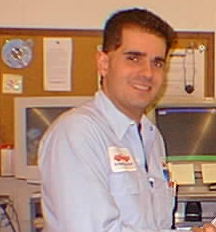Giammalvo Files

Mark Giammalvo specializes in driveability
diagnostics at his family
business, Sam Giammalvo's Auto Sales & Service,
Inc. in New Bedford,
MA.
Mark, who has been with the business for
over 20 years, is an ASE
Master Technician and Parts Specialist. He also holds the ASE
L1 certification, and has an associates degree
in business management.
Mark is also a writer for Motor Age Magazine
and is the past secretary of the Alliance of Automotive Service
Professionals, (AASP).
|

What Else Could Go Wrong?
(Printed in the Journal
of The Alliance of Automotive Service Providers, AASP)
This summer did not exactly leave me yearning for next years a/c work. Back
in July, we had a regular customer come in with his 12-year young, 110,000
mile, Mercury Topaz. A little over a year ago the customer had us replace
an a/c line and now the car, was again, not cooling properly. A black light
test revealed that a second a/c line was leaking. The customer was given a
price to replace the line, and to evacuate and recharge the system. When the
Topaz found its way back to us for its appointment, our technician installed
the new hose and began his evacuate and recharge procedure. It was now near
the end of the day and the customer was in the waiting area and looking foreword
to driving his cool Tempo back home. After our technician completed the
recharge, he started the engine to check the systems operation. Suddenly,
out of the corner of my eye, I saw clouds of smoke billowing out from under
the hood. The customer saw the smoke too and was now staring at us owl eyed
from the waiting room window. After a closer inspection we found that the
smoke was coming from the compressor clutch. Most likely the clutch was
slipping or the compressor was seizing. Evidently, the 110,000 mile compressor
decided that it was too tired to push a full load of Freon. Now I had that
wonderful daily task of breaking bad news to a customer. I brought the customer
out and explained what had transpired. The customer questioned us as to
why we did not know the compressor was bad in the first place. I advised
the customer that the compressor was working fine, but now, probably normal
wear and tear had finally taken its toll. Not really an unusual event in
that the car had aged considerably on both time and mileage. Now the customer
and I were, sort of, in a bind. The customer still owed us for replacing
the new a/c line yet was not going to appreciate that repair since he still
had no a/c. I called for parts pricing and gave the customer a more-than-fair
estimate to repair the car. The normal list price on the compressor was 505.21.
I told him I would install the part at our cost of 389.65, and he pays the
labor. Then thee customer asked me the golden question: What other parts
in the a/c system could fail in the future? I brought out a glossy flip chart
of a generic a/c system and showed him some other items that had never been
changed, namely, the condenser and evaporator. We discussed the approximate
labor and parts cost to replace those items, if they failed down the road.
At this point the customer made an interesting remark. He said that "had
he known all these other parts could fail, he would not have repaired the
a/c line in the first place." I could understand his point to some degree.
Then again, we cannot possibly take the time to explain to every customer
all the different parts that could fail in a certain system, or sub system,
on their car. If we did, we'd be lucky to fix at least one car a day. As
it is, we spend a lot of time with customers discussing their needs and repairs.
More time than you get at the doctor's office, that's for sure.
At this point the customer called his wife and discussed the options. In
the end, the customer decided not to replace the compressor. As a measure
of goodwill, I reduced the price of the new a/c line to cost.

|